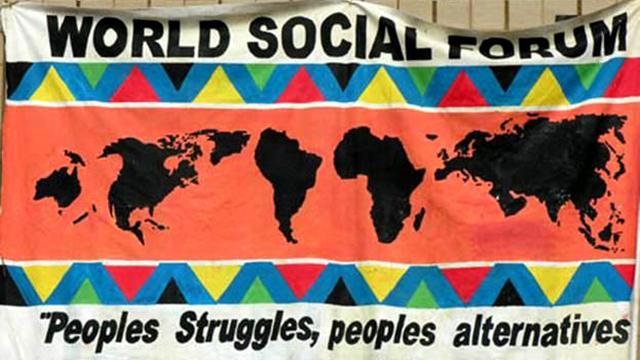
It’s not easy figuring out which of the 350 or so daily panels to attend at the World Social Forum this week in Tunis. Human rights, women’s freedoms, immigration conflicts, agriculture policy—the list runs the gamut. Sometimes you just want to drink a coffee and stand in one of the crowded sunny plazas at El Manar University, where the global gathering is in full swing, and meet some of the tens of thousands who have shown up to exchange ideas, advance projects and get inspired.
The spirit of the Arab Spring still feels palpable here, in its birthplace, Tunisia. And though the next wave of global rebellion won’t likely emerge from these campus classrooms filled with activists, the Forum is an event—an obvious staging ground—where the relationships, strategies and pieces of future resistance are being set.
So, in the short time available, you scramble at the Forum to find what interests you most. And sometimes, as was the case today, decisions sometimes seem to be made for you.
Corporate Tax Avoidance
The two sessions I planned to attend on Wednesday morning—“Radical Critique of Policies Based on the Consolidation of Power of Transnational Financially Structured Oligopolies” and “Trans-Pacific Partnership: Corporate Power Tool of the 1% and Threat to Multilateralism”—were both cancelled due to a lack of turnout.
Instead I wound up at a panel entitled “Mobilizing for Tax Justice in the Extractive Sector,” which was led by Tax Justice Network—Africa. The talk focused on the staggering degree of tax avoidance that is now standard among international mining companies operating in Africa and Asia.By now many of us have heard about the tax-dodging exploits of Google, Starbucks, Apple and the like. But mining companies are harvesting mega-minerals for mega-bucks and not paying a dime to host countries, which are losing vast sums in lost revenues as they watch corporations exploit tax loopholes and declare zero profits while siphoning immense wealth and material out of country.
On the panel, a man from Ghana explained how “millions of dollars annually are being looted, literally, through bureaucratic schemes,” and that Ghana’s government along with civil society groups are now finally reviewing and attempting to renegotiate mining terms in order to start generating tax revenues. “The time of oil and mining companies dodging taxes and taking all the wealth out of countries must come to an end,” he stated. But how this will be done is a more difficult proposition.
Sharing the panel with him was a man from Malawi who reported that the biggest foreign investment that had occurred in his country was a recent $500 million mining project established by Paladin Energy, of Australia,to extract uranium for a market that is expected to contribute 30% to Malawi’s GDP in the next five years. Amazingly, Paladin to date has only managed to register losses on its tax sheets, so it doesn’t pay the government a cent; on the contrary, it continues to be showered with state incentives.
However, the World Social Forum doesn’t just bring people together to talk about the bad news; it also gets people educated about the progress being made. In many nations initiatives are underway to reverse the tax avoidance trend in the mining sector, as governments and organizations press for greater transparency while demanding that firms start to pay damages for their polluting activities, said Michelle Pressend of the Economic Justice Network.
“It’s time to move beyond the issue of how to collect royalties and broaden the public’s understanding of the mining companies, their powers and interests and how they manipulate our governments,” Pressend said. “We’re calling for fair taxation of these corporations and to expose the tax havens that sit in the northern part of the world.”
Trade Unions Finding New Power?
One criticism of the World Social Forum—which started 12 years ago in Porto Alegre, Brazil, and became a bi-annual global hub for activists, but was widely recognized for failing to impact the political or economic decision-making stage—is that it did not employ the power of unionized workers. And this year, said a Norwegian labor organizer and author I met, named Asbjorn Wahl, appears no different.
“The people who come to the World Social Forum aren’t leaders of social movements—they are activists. There is thinking, there are speeches, but they do not represent a mass movement in the streets,” Wahl said. Rather, what’s needed here, he said is the presence of trade unions.
“I don’t think we can win this struggle [against neoliberalist policies] without organizing and structure. It has to come to a social confrontation in the streets, with strikes.”
For the past year and a half, Wahl has been helping develop the Alter Summit, which aims to bring together Europe’s trade unions and social movements into a joint platform of resistance against neoliberal, free market policies. The Alter Summit already has the support of major unions across the continent, including the largest ones in Italy, Spain, Portugal, France and Belgium. It is also backed in Britain.
Next month the Summit’s Coordinating Committee heads to Zagreb, Croatia, to finish the final writing and approval of its Manifesto—a document that includes measures to fight austerity policies, cancel or reduce government debt, take democratic control of banks and financial institutions, put more aggressive safeguards on climate and resource use, and establish new measures to tax corporations and redistribute wealth. Wahl said the Manifesto will be launched at a June 7-9 meeting in Athens that thousands of unionists are expected to attend.
Debt – and Trade Unions’ Duty to Help Eradicate It
The question about organized labor’s involvement deepened at an afternoon panel entitled, “Which Labor Union and Non-Profit Alliances to Face the Debt? Mobilizations for a Citizens Audit.” There, international trade union members spoke heatedly, and passionately, about the ways that debt has, in the words of one speaker from Belgium, “become dominant over our populations.”
“We have to demystify the question of indefinite financing and think about how we’re creating debt in Europe,” he said, then “create a common front against debt.” By “common front” he was referring to one of the tools now being effectively employed across nations: the Citizens Debt Audit.
From the Senegalese trade unionist, who spoke about the $6 billion debt his country accrued in recent years amid privatizations that wiped out state services across many sectors, to the Basque trade unionist who advocated Labor’s rolein Spain pushing the Citizens Debt Audit initiative, because “government failed to fulfill its obligations, from health to education to housing,”the stakeswere clear: unions no longer have a choice, they said, but to lead the battle against public debt.
“Trade unions realized that they had to work on this question of debt in Senegal,” said the Senegalese unionist. “Now they’re seeing they must work on it, because it’s not the population that created the debt, but the small number of people who benefitted from it.”
From Africa to Europe, from South to North, he said, “The question of the debt audit is international.”
In Spain, the Citizens Debt Audit which grew out of the 15M movement has been especially picking up steam since the last round of billions in bank bailouts, which coincided with the government’s threat to cut the country’s vital health and other key services that it preserved for decades following the death of dictator Francisco Franco. “The reason they give us for cutting services is that there is no money,” said the Basque trade unionist.
“But under [President Jose Luis Rodriguez] Zapatero, they changed the Constitution to institute a measure obligating the country to pay its debts before it handles social needs, with nasty consequences for the working class. For this reason, the question of debt plays an essential role for organized labor,” he said.
The hope of the Citizen Debt Audit, say labor organizers, is to arm people with the legal and policy instruments needed at the municipal as well as federal levels in order for communities to question “which debt is legitimate and which is not.”
And then, said the man from Basque country, who was speaking to a full crowd packed into one of the small classrooms at the Tunis university: “If the debt isn’t legitimate, we don’t need to pay it.”
Stay tuned for more coverage of the World Social Forum.
3 WAYS TO SHOW YOUR SUPPORT
- Log in to post comments














